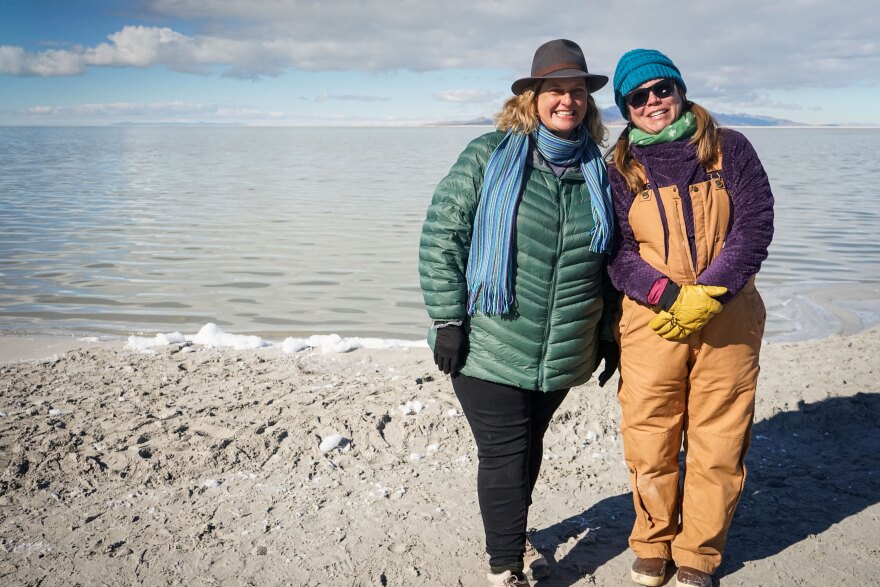The salty, eggy stink of the Great Salt Lake smacks you right in the face on the drive to Antelope Island.
Along the nearly seven-mile-long causeway to the island, there are hundreds, maybe thousands of birds.
Past the birds is a dried up marina, where water should be.
Out on the island, communing with nature, is Nan Seymour. She’s been camping just off the shores of the lake since mid-January.
“When the life of someone you love is at stake, you stay with them,” said Seymour, a local poet and founder of the River Writing Collective.
She described the community of writers as people who “care an awful lot about the world and, in particular, the Great Salt Lake.”
After last summer’s historic drought and years of diverting water from it for public use, the lake’s water level reached an all-time low.

Right now, state lawmakers are working on legislation in the hopes of restoring it.
Seymour plans to keep vigil at the lake throughout the legislative session.
“We don't know if it's too late to save the lake,” she said. “We hope it isn't. But what we do know is this is our beloved. So to be present while her life is in peril is the point of the vigil, from the poetic perspective.”
Her vigil is in tandem with the creation of a poem called “irreplaceable.” When it’s finished, it will be at least 1,700 lines long. Seymour said that number represents the square miles of water that some people say would be a fully restored lake.
“It's a prayer, really,” she said. “We're letting the praise for the lake flow, so that there's energetically something beckoning the lake back.”

The work is a community effort. Seymour has written some verses, but she’s also collecting words from anyone who wants to contribute.
“The voices in the poem are voices of all kinds of people about their relationship with the lake,” she said. “To turn, I think, hearts and faces to the lake, and to help shift the culture that I grew up in here of apathy and disdain for the lake into a culture of love and reverence.”
She hasn’t been keeping watch completely alone, either.
Jaimi Butler, coordinator of the Great Salt Lake Institute at Westminster College, is a certified lake nerd. She’s a biologist with tattoos of brine shrimp on her arm.

At first, she said she didn’t know what moved her to camp out of her truck during the winter for nearly a week.
“I didn't discover until last night that I came here to speak for the lake,” Butler said a couple of days into her stay. “I have 23 years of experience and enthusiasm and passion. It's not just that I've been here, it's that I love to be here, and I wanted to take responsibility for that love, that knowledge and understanding and give that to people who are coming out.”
The poem and the vigil have brought some people out who have never smelled the lake’s stink before, like 16-year-old Glory Oduntan.
“It was so beautiful,” Oduntan said a few days after her visit. “When we were driving up, I was like, ‘Oh, my gosh.’ Every little thing caught my eye. The smell wasn't pleasant, but it wasn't bad. The mountains over there were so, so pretty, and the water was super, super cold.”
Oduntan is a senior at Granger High School in West Valley City. She visited Antelope Island with her service learning class to find out about the lake and create some poetry with Seymour.

As she was writing, she said she felt bad that she didn’t know about the lake and what it has provided for people throughout its life. In her poem, Oduntan portrays the lake as a woman.
“Just being there, it gave me mom vibes,” she said. “A mom gives us so much, but you don't realize it. It just makes me think of how women give so much to people and to their child, but you don't really see that beauty until it's slowly fading away.”
She said she hopes people — especially young ones — read the poem and get inspired to go out and visit the lake. If they can connect with it, she says she believes that will lead them to take action.
“I hope that people can appreciate what's there and not just when it's fleeting,” she said. “Because I feel like if the lake wasn't drying up, I wouldn't have really gotten the chance or seen the importance of how beautiful it was. I feel like we should all appreciate nature because sometimes it disappears.”
Seymour and other community members plan to read the poem “irreplaceable” in its entirety at Antelope Island on Feb. 19.





